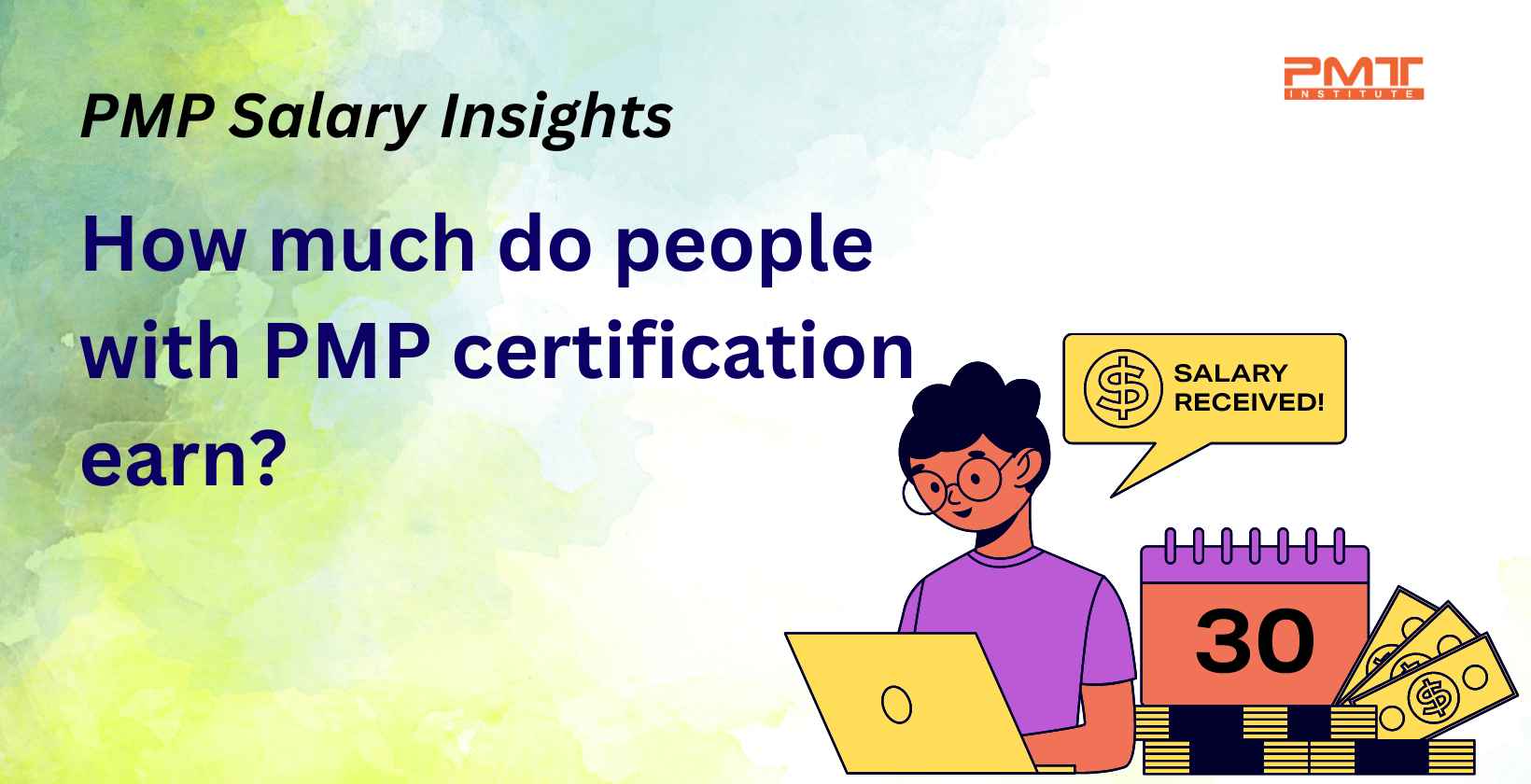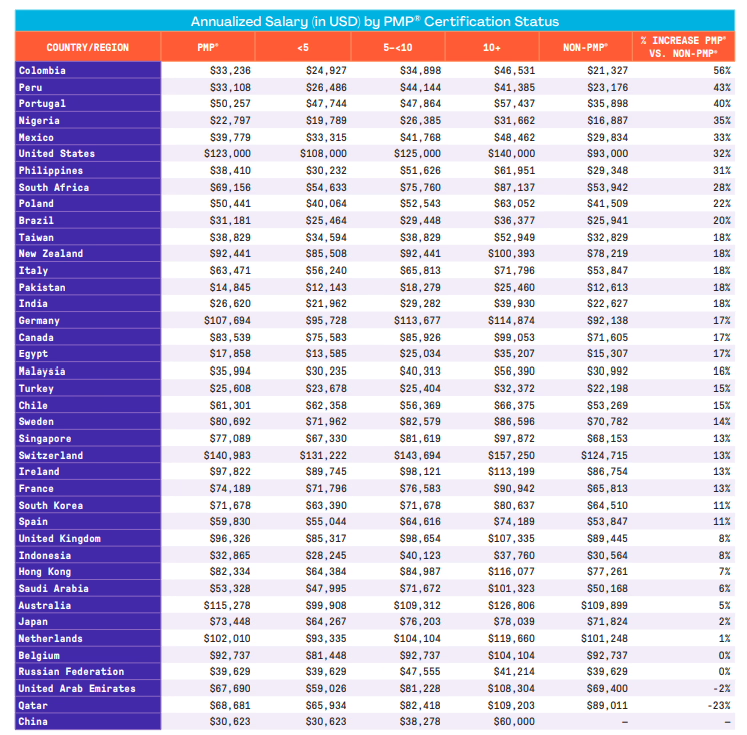How much do people with PMP certification earn? PMP Salary Insights
Published:
Updated:

Project Management Professional (PMP) certification is a highly sought-after credential in the field of project management. Issued by the Project Management Institute (PMI), it validates a project manager's knowledge, skills, and expertise in leading and executing projects effectively. In recent years, the demand for PMP certification has surged as organizations recognize the value of certified project managers in driving successful projects and achieving strategic objectives.
Project Management Professional (PMP) certification is a globally recognized credential that holds immense value for project management professionals seeking to enhance their careers and earning potential. In today's fast-paced and competitive business environment, effective project management has become crucial for organizations to thrive. As a result, the demand for skilled project managers who can drive successful project outcomes has grown exponentially. PMP certification has emerged as a definitive benchmark for identifying competent project managers who possess the knowledge, experience, and expertise to deliver projects with excellence.
With its emphasis on adhering to industry-accepted best practices and principles of project management, PMP certification signifies a commitment to upholding the highest standards of professionalism in the field. It equips project managers with a robust toolkit of skills and strategies to tackle complex challenges, manage stakeholders, and navigate through uncertainties that arise during the project lifecycle.
In this blog, we will delve into the significance of PMP certification and its far-reaching impact on salary levels and career advancement opportunities for project management professionals. By exploring real-world statistics, industry insights, and success stories, we aim to shed light on the tangible benefits that PMP certification brings to the table.
Whether you are a seasoned project manager looking to elevate your career or an aspiring professional seeking to enter the field, this blog will serve as a comprehensive guide to understanding the value and importance of PMP certification in today's competitive job market.
The Importance of PMP Certification
The PMP certification 35 hours is designed to ensure that project managers possess a standardized set of skills and knowledge required to excel in their roles. It is based on the Project Management Body of Knowledge (PMBOK) Guide, which outlines the best practices and principles of project management. Here are some key reasons why PMP certification is crucial:
Global Recognition
PMP certification is recognized worldwide and is considered the gold standard for project management professionals. It demonstrates a project manager's commitment to their profession and their ability to adhere to internationally accepted project management practices.
Skill Validation
To attain PMP certification, candidates must demonstrate their proficiency in various project management areas, such as project initiation, planning, execution, monitoring, and closing. The rigorous certification process ensures that certified project managers possess the necessary skills to manage projects successfully.
Enhanced Marketability
PMP certification enhances project managers' marketability and makes them stand out among their peers. It provides a competitive edge when applying for job opportunities and can lead to higher chances of landing coveted roles.
Professional Development
Pursuing PMP certification encourages ongoing professional development. Certified professionals are required to maintain their certification through continuous learning, keeping them updated with the latest trends and best practices in project management.
Impact of PMP Certification on Salary
One of the most significant incentives for professionals to obtain PMP certification is the potential increase in salary. Numerous surveys and studies have shown that PMP-certified project managers tend to earn higher salaries compared to their non-certified counterparts. Here are some factors contributing to this impact:
Employer Recognition
Organizations value PMP certification and are willing to compensate certified project managers accordingly. PMP holders are seen as competent leaders capable of managing projects efficiently, reducing the risk of project failures, and maximizing returns on investments.
Career Advancement
PMP certification opens doors to higher-level positions and leadership roles within an organization. With increased responsibilities and strategic decision-making involvement, PMP-certified professionals are often rewarded with higher salaries commensurate with their elevated roles.
Competitive Advantage
In today's competitive job market, having PMP certification sets candidates apart from others. When employers have a pool of candidates to choose from, PMP certification can be a decisive factor in determining who gets the job offer.
Industry Demand
Certain industries, such as information technology, construction, and healthcare, heavily rely on project management to drive business success. In these industries, PMP certification is highly valued, leading to higher salary offers.
Regional Variation
Salary levels for PMP-certified professionals can vary significantly based on geographic location. Major cities and regions with a high demand for skilled project managers typically offer more competitive salaries.
Salary Statistics for PMP-Certified Professionals
As PMP certification continues to gain popularity, salary surveys provide valuable insights into the earning potential of certified project managers across different regions:
United States
According to the Project Management Institute's "Earning Power: Project Management Salary Survey" (2021), the median salary for PMP-certified professionals in the United States is $120,000, while non-certified project managers earn a median salary of $94,000.

Source: Project Management Institute's "Earning Power: Project Management Salary Survey" (2021)
Canada
In Canada, PMP certification is also associated with higher earning potential. PMP-certified professionals earn a median salary of CAD 120,000, compared to CAD 98,000 for non-certified project managers, according to the PMI "Earning Power: Project Management Salary Survey" (2020).
United Kingdom
PMP-certified professionals in the United Kingdom earn an average salary ranging from £55,000 to £70,000 per year, depending on experience and industry.
Australia
PMP-certified professionals in Australia enjoy a higher earning potential, with the average annual income ranging from AU$100,000 to AU$150,000, depending on experience and industry.
Career Advancement and Growth Opportunities
Apart from salary benefits, PMP certification opens up numerous career advancement and growth opportunities for project managers:
Leadership Roles
PMP-certified professionals are well-equipped to take on leadership roles, such as project managers, program managers, or portfolio managers. These positions offer increased responsibilities, decision-making authority, and potential for career growth.
Global Mobility
With PMP certification, professionals can pursue job opportunities not only in their home countries but also in different parts of the world. The certification's global recognition facilitates international mobility and access to diverse projects.
Entrepreneurial Ventures
PMP-certified professionals who aspire to launch their own businesses or consulting firms can benefit from the credibility and trust associated with the certification. Clients are more likely to choose certified project managers for their projects, enhancing business prospects.
Cross-Industry Opportunities
PMP certification is transferable across industries. Project managers with PMP credentials can leverage their expertise in diverse sectors, broadening their career prospects and adaptability.
Continuous Learning
PMP certification encourages a commitment to lifelong learning and professional development. Certified professionals stay abreast of the latest advancements in project management, which can lead to innovative problem-solving and efficient project delivery.
Factors Impacting Salary Variation
The salary variation for PMP-certified professionals is influenced by several factors, including:
Experience Level
A project manager's level of experience plays a significant role in determining their salary. More experienced professionals with a proven track record of successfully managing complex projects are likely to earn higher salaries.
Geographic Location
The cost of living and local market demand impact salary levels. PMP-certified professionals working in metropolitan areas or regions with a higher demand for project managers often command higher salaries.
Industry
Different industries offer varying levels of compensation. Industries that heavily rely on project management, such as IT and healthcare, are likely to offer higher salaries for PMP-certified professionals.
Organization Size
The size of an organization can also affect salary levels. Larger companies with larger-scale projects and higher budgets may offer more competitive salaries for PMP-certified professionals.
Additional Skills and Certifications
PMP certification complements other specialized certifications, such as Agile, Six Sigma, and ITIL. Professionals with multiple certifications may have an advantage in salary negotiations.
Education and Qualifications
In addition to PMP certification, advanced degrees and specialized qualifications can influence salary levels. Professionals with master's degrees in project management or related fields may command higher salaries.
Professional Achievements
Accomplishments and recognition in the field of project management can contribute to salary increments. Project managers with a proven track record of successfully delivering high-impact projects may negotiate higher compensation.
Negotiation Skills
A project manager's ability to negotiate effectively can impact their salary. Those with strong negotiation skills can advocate for better compensation packages, including higher base salaries, bonuses, or additional benefits.
Organizational Performance
In some cases, salary levels may be tied to the overall performance of the organization. PMP-certified professionals contributing to the organization's success may be rewarded with performance-based bonuses or incentives.
Economic Conditions
Economic factors, such as inflation rates and the overall economic climate, can influence salary levels across industries and geographic regions.
Industry Certifications
In addition to PMP certification, industry-specific certifications can enhance earning potential. Certifications tailored to a particular sector, such as healthcare or finance, can lead to higher salaries in those industries.
Work-Life Balance
For some professionals, work-life balance and flexible work arrangements may be equally important as salary. Employers offering attractive work-life balance benefits may attract and retain PMP-certified talent.
Company Culture
Organizational culture, values, and employee recognition practices may impact salary levels. Companies with a culture of rewarding and valuing their employees' contributions may offer competitive compensation packages.
Market Demand for Specific Skills
Specific skills, such as Agile project management or data analytics, maybe in high demand in certain industries. PMP-certified professionals with additional sought-after skills can command higher salaries.
PMP certification has emerged as a crucial milestone in the careers of project management professionals worldwide. Its significance lies not only in validating skills and expertise but also in elevating earning potential and opening doors to diverse career opportunities. The impact of PMP certification on salary levels is undeniable, as demonstrated by numerous surveys and reports.
As businesses become increasingly complex and project-oriented, the demand for skilled project managers continues to grow. Employers seek professionals who can navigate challenges, mitigate risks, and drive successful project outcomes. PMP certification equips project managers with a comprehensive toolkit of project management knowledge and best practices, positioning them as valuable assets to organizations.
The competitive edge offered by PMP certification is not limited to the salary package but extends to career advancement and growth prospects. PMP-certified professionals are entrusted with high-stakes projects, strategic initiatives, and leadership responsibilities. These roles provide a platform to showcase expertise and make a significant impact on an organization's success.
Moreover, the global recognition of PMP certification transcends geographic boundaries. Certified project managers have the opportunity to work on international projects, collaborate with diverse teams, and gain exposure to different business cultures. This international mobility opens doors to a world of exciting projects and cross-cultural experiences.
To maintain the credibility of the PMP certification, PMI emphasizes the importance of continuous learning and professional development. PMP-certified professionals must continuously update their skills and stay abreast of industry trends. This commitment to ongoing improvement ensures that PMP holders remain at the forefront of project management practices and innovation.
Conclusion
PMP certification not only elevates salary levels for project management professionals but also ignites a journey of continuous growth and professional excellence. By earning the PMP credential, professionals showcase their dedication to their craft and their commitment to delivering successful projects that drive organizational success. As organizations increasingly prioritize project management excellence, the value of PMP certification will only continue to rise, cementing its position as an indispensable asset for aspiring and seasoned project managers alike.


